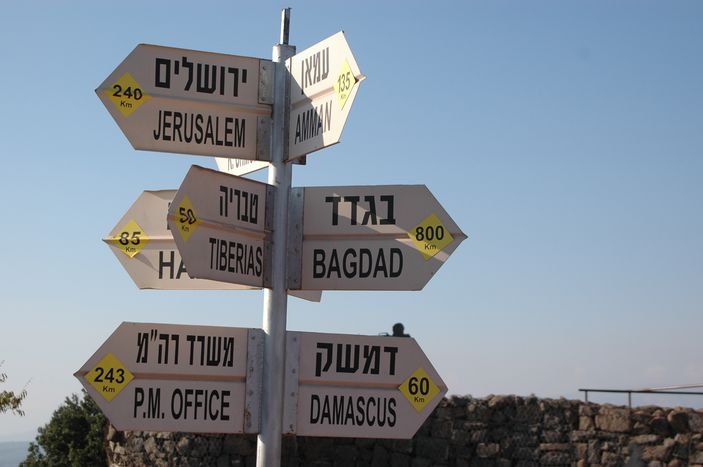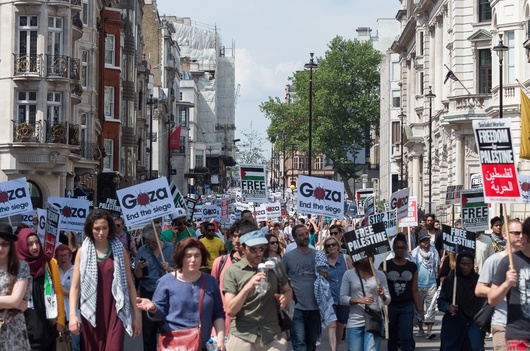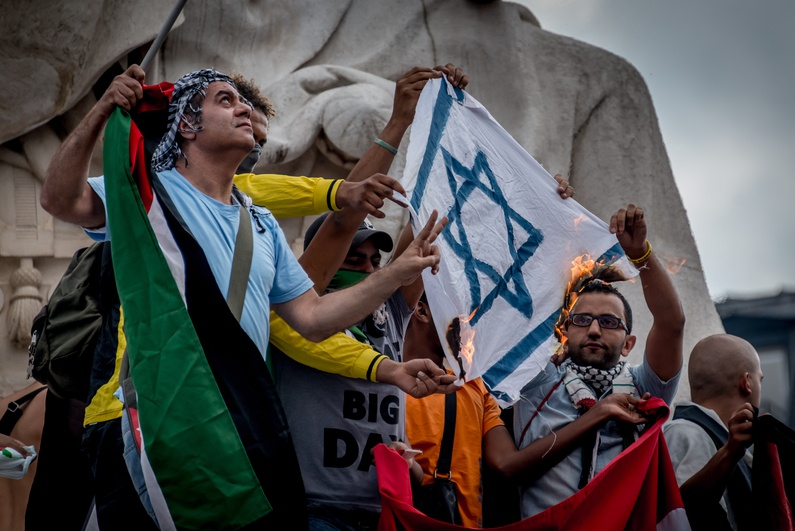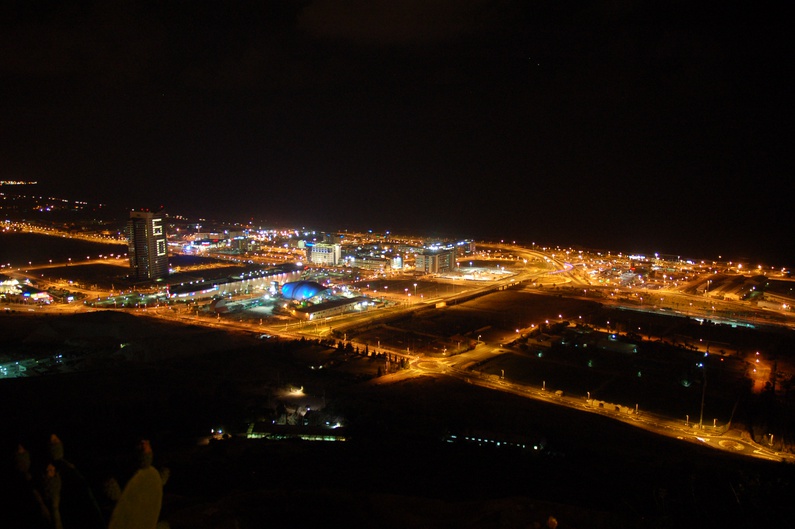
Youth and Yerida: The Children of Israel Want to See the World (Part 2)
Published on
Translation by:
Thomas McGuinnThey’re young adults, around 20 years old, and they’ve decided to leave their homeland of Israel in search of new cultures and realities. With the conflict between Israel and Palestine providing the backdrop and anti-Semitism apparently brewing at times at the heart of the EU, Ravé, Tal and D. tell us about their experiences in Europe and how they view the situation in their country.
(Not yet read part one? Click here!)
Gaza, anti-Zionism and anti-Semitism
 Months before the Israeli army launched Operation Protective Edge, its final offensive on the Gaza Strip, the European Union’s Fundamental Rights Agency (FRA) published a report which revealed that 66% of the around 6,000 members of the Jewish community interviewed identified anti-Semitism as a problem in the country in which they live. A further 75% of the participants stated that hatred towards Jews had increased over the last five years. None of the demonstrators have suffered anti-Semitic attacks directly, although Tal explained that the owners of an Egyptian restaurant in London “went from being very friendly to very arrogant when they found out that I was from Israel”, and Ravé recalled the case where some Jews had been attacked on the Berlin metro.
Months before the Israeli army launched Operation Protective Edge, its final offensive on the Gaza Strip, the European Union’s Fundamental Rights Agency (FRA) published a report which revealed that 66% of the around 6,000 members of the Jewish community interviewed identified anti-Semitism as a problem in the country in which they live. A further 75% of the participants stated that hatred towards Jews had increased over the last five years. None of the demonstrators have suffered anti-Semitic attacks directly, although Tal explained that the owners of an Egyptian restaurant in London “went from being very friendly to very arrogant when they found out that I was from Israel”, and Ravé recalled the case where some Jews had been attacked on the Berlin metro.
Ever since the Israeli government launched Operation Protective Edge on Gaza last July, the world has witnessed a polarisation of society, with people positioning themselves either in favour of or in opposition to Israel, and often confusing anti-Semitism with anti-Zionism. Dozens of demonstrations have taken place all across the continent against an intervention which has taken the lives of around 2,000 people and pulverised hundreds of homes, hospitals and schools in the Palestinian territory surrounded by Israel and the Mediterranean Sea. In Paris, some of these protests resulted in violent altercations and hateful outbursts towards Jews. In the United Kingdom, various demonstrations took place in front of the synagogues of the big cities, a location which D. believes wasn’t the most appropriate: “I don’t think places of worship are the right place to hold political demonstrations, because the demonstrators opposed the State of Israel and protested in front of Jewish people who have no reason necessarily to support Israel”. Equally, Ravé claimed that many people “don’t understand” the situation which is transpiring in his country. He said that “if some Europeans went there for a while and could get a feel for the situation, maybe they’d be able to understand us. I suggest that they go and live in a town bordering Gaza for a year and meet people who live there. Find out what their everyday life is like with all the sirens sounding all the time to tell them to take refuge in their houses…that’s what normal everyday life is like for them."
 The same study carried out by the FRA also revealed that 59% of the people surveyed blamed the media for propagating the anti-Jewish message. In this sense, Ravé denounced that “Hamas was launching rockets from hospitals and schools in Gaza, but the media aren’t showing this. It really is very easy to show these poor people and what Israel’s doing, because Israel is stronger than Gaza…but Israel is also helping in the fight against Hamas and we’re even helping them out with field hospitals”. Likewise, Tal said that “the media show what our government is doing, but this isn’t a true representation of the facts or of what the people want to have or do, because people need to know that Israel is supplying Gaza with food and medicine; we’re helping them and even treating them in our hospitals”.
The same study carried out by the FRA also revealed that 59% of the people surveyed blamed the media for propagating the anti-Jewish message. In this sense, Ravé denounced that “Hamas was launching rockets from hospitals and schools in Gaza, but the media aren’t showing this. It really is very easy to show these poor people and what Israel’s doing, because Israel is stronger than Gaza…but Israel is also helping in the fight against Hamas and we’re even helping them out with field hospitals”. Likewise, Tal said that “the media show what our government is doing, but this isn’t a true representation of the facts or of what the people want to have or do, because people need to know that Israel is supplying Gaza with food and medicine; we’re helping them and even treating them in our hospitals”.
Returning home
When asked about the future, all of them expressed their desire for the conflict between both countries to be solved soon. “Most Palestinians and Jews just want to live in peace, go to work and come home at night to be with their children; the problem is that there are religious extremists on both sides,” explained D. “I think the State of Israel should improve the lives of the people of Gaza and make more of an effort to achieve peace, but Hamas also has to recognise that the State of Israel has the right to exist…only then will we be able to hold discussions about borders and what land should belong to the future State of Palestine, and I honestly hope that they have it one day,” she added. The student concluded by saying that “any peace agreement that is reached in the Near East will accommodate both countries’ mutual recognition that we have to live together.”
 These three young people were born and grew up in different parts of Israel and, despite being aware of the situation there, they assured us that they’d like to return in the future, because “it’s their home”, something which goes much deeper than religion. “I’m not religious,” said Tal. “I observe my festivals and do some things simply to maintain the basic things that a Jewish person should maintain…it’s nothing to do with religion, it’s about conserving a culture which differentiates you from the others.” D. shared her opinion, highlighting how Israel’s society has changed a lot. “Being Jewish in this day and age is a lot different to what it used to be like for Jews two generations ago; people no longer want to feel as though their religion is preventing them from eating certain types of food or marrying certain people…it’s all a process, and I’m still trying to work out what being Jewish means to me."
These three young people were born and grew up in different parts of Israel and, despite being aware of the situation there, they assured us that they’d like to return in the future, because “it’s their home”, something which goes much deeper than religion. “I’m not religious,” said Tal. “I observe my festivals and do some things simply to maintain the basic things that a Jewish person should maintain…it’s nothing to do with religion, it’s about conserving a culture which differentiates you from the others.” D. shared her opinion, highlighting how Israel’s society has changed a lot. “Being Jewish in this day and age is a lot different to what it used to be like for Jews two generations ago; people no longer want to feel as though their religion is preventing them from eating certain types of food or marrying certain people…it’s all a process, and I’m still trying to work out what being Jewish means to me."
Translated from Jóvenes y Yerida: Los hijos de Israel quieren ver mundo (Parte 2)



